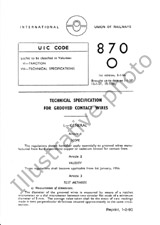We need your consent to use the individual data so that you can see information about your interests, among other things. Click "OK" to give your consent.

UIC B169/RP34-1ed.
Wheels - Thermomechanical loads on small-diameter wheels braked with composite brake blocks
Translate name
STANDARD published on 1.1.2008
The information about the standard:
Designation standards: UIC B169/RP34-1ed.
Publication date standards: 1.1.2008
SKU: NS-1190382
The number of pages: 55
Approximate weight : 165 g (0.36 lbs)
Country: International technical standard
Category: Technical standards UIC
Annotation of standard text UIC B169/RP34-1ed. :
Given the forecast replacement of cast iron brake blocks with composite blocks as part of an initiative driven by the EU directive on railway noise abatement, the UIC designed a series of bench tests to reproduce braking incidents, with a view to approving brake blocks in 2Bg configuration on 920mm diameter wheels, and the relevant acceptance criteria.
When composite brake block requirements are met, wheels may be placed into service, after a braking incident, without any extra supplementary protective measures. If the aforementioned requirements are not satisfied, the brake block must be discarded, or can only be placed into service when accompanied with special maintenance instructions.
Extra tests were conducted to see if results obtained in 2Bg configurations on a 920 mm wheel were transposable to other configurations and smaller wheel diameters.
With the current level of knowledge, the overall level of safety is at least the same (GAME) for the reference configuration in RP 23 (2Bg with a 920 mm wheel) and the tested configurations (2Bg and 1Bg on wheels with nominal diameter of 840, 740 and 680 mm).
When the results for exceptional load tests conducted in accordance with RP 23 are satisfactory, the tested brake block can be used in revenue service in any configuration without supplementary maintenance requirements.
However, if the block fails the test, the manufacture may ask approval for specific application only. This report contains the relevant test conditions and acceptance criteria for this special approval.
"+
"
Name:Räder - Außergewöhnliche thermomechanische Beanspruchung kleiner, verbundstoffgebremsten Räder|
Im Hinblick auf den Einsatz von Verbundstoffsohlen anstelle von Graugusssohlen im Rahmen der EU-Richtlinie zur Reduzierung der Lärmabstrahlung von Eisenbahnfahrzeugen hat die UIC ein für Bremsstörungen repräsentatives Prüfstandprogramm erstellt, für die Zulassung von Bremssohlen in der Klotzanordnung 2xBg auf Rädern O 920 mm und die Bewertung der zugehörigen Annahmekriterien. Wenn die Anforderungen an die Sohlen eingehalten werden, können die Räder nach einer Bremsstörung ohne zusätzliche Schutzmaßnahmen in Betrieb genommen werden. Werden die Anforderungen nicht eingehalten, so ist die Sohle entweder abzulehnen oder kann nur mit spezifischen Instandhaltungsmaßnahmen in Betrieb genommen werden.
Es wurden ergänzende Versuche durchgeführt, um zu überprüfen, in wie weit die Ergebnisse der Klotzanordnung 2xBg auf einem Rad O 920 mm auf andere Konfigurationen und Räder kleineren Durchmessers übertragbar sind.
Nach dem augenblicklichen Kenntnisstand ist das globale Sicherheitsniveau zwischen der Grundbremsklotzanordnung des RP 23 (2Bg für Räder mit einem Durchmesser von 920 mm) und den verschiedenen erprobten Bremsklotzanordnungen - 2Bg und 1Bg für Räder mit einem Nenndurchmesser von 840, 740 und 680 mm - mindestens gleichwertig (GAME).
Wenn das Ergebnis der außergewöhnlichen Belastungsversuche gemäß dem RP 23 zufriedenstellend ist, kann die erprobte Sohle ohne besondere Instandhaltungsmaßnahmen in allen Anordnungen im kommerziellen Betrieb eingesetzt werden.
Bei einem negativen Ergebnis kann jedoch der Hersteller die Zulassung für eine besondere Anwendung beantragen. Für diesen Fall sind die besonderen Prüfbedingungen und Annahmekriterien im vorliegenden Bericht festgelegt.
"+
"
We recommend:
Technical standards updating
Do you want to make sure you use only the valid technical standards?
We can offer you a solution which will provide you a monthly overview concerning the updating of standards which you use.
Would you like to know more? Look at this page.



 Cookies
Cookies
